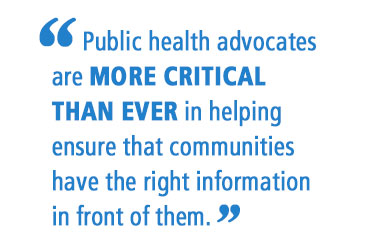When it comes to encouraging people to get vaccinated against COVID-19, clear communication is key, says Cedric “Jamie” Rutland, MD, a board-certified pulmonary and critical care physician based in Southern California. Rutland is creator of “Medicine Deconstructed” and co-host of “Barbershop Medicine,” a new series hosted on APHA’s YouTube channel that is helping address hesitancy about COVID-19 vaccinations among people of color.
When COVID-19 vaccines rolled out nationwide earlier this year, there was a glimmer of hope in returning to normalcy. Fast forward to now, when outbreaks are happening at a startling rate in heavily unvaccinated areas. As they near capacity, hospitals are once more asking the community to take measures to stay safe, including vaccinations.
As a pulmonary and critical care physician based in California, the surge came as little surprise. Returning to normal before things are actually normal may be a good move for the economy and morale, but is certainly not a standard public health practice. In light of changing guidance and a deluge of misinformation, where can the community turn for reliable information about what’s going on, what the risks are and what the right thing to do is?
As the delta variant cases grow and some communities continue to have low vaccination rates — particularly minority communities — three major points are key to a sustainable return to normalcy:
1. Teach before telling, but remember to speak in a way your audience understands
When it comes to vaccination rates, employing trusted messengers to speak with communities is absolutely essential to having a positive impact.
Recently, my colleague and I had the honor of engaging with Dr. Anthony Fauci about how public health can close the gap in COVID-19 vaccination rates by sharing good information and engaging with community partners through what we dubbed “Barbershop Medicine.” Barbershops traditionally have been safe spaces for black and brown communities to share information and openly share concerns and information with one another.
Public health advocates can similarly find ways to empower others so that they can talk to hesitant friends, families and colleagues in their own safe spaces. Communications should be clear, in layman’s terms and include relatable examples of other trusted vaccines, such as those for polio and measles.
2. Acknowledge medical system distrust and the history behind it
Communicating as public health advocates in safe and trusted spaces can have a huge impact in helping get the latest and most accurate information in a credible way, but the message must be supported with information that resonates within the audiences you’re reaching out to.
Minority communities in the U.S. have reason to be distrustful of the medical system, and acknowledging fears and the reality of past transgressions is essential. Avoid talking at the audiences you want to engage with. Instead, treat vaccination conversations as an opportunity for a dialogue and education.
3. Contextualize information using technology
Providing trusted and accurate data on trends in the community can help with understanding the local impact of the virus. For example, Google has a user-friendly dashboard that makes it easy to see local vaccination rates and the impact of the virus. Its COVID-19 Community Mobility Report shows trends in movement, including retail, recreation, groceries, pharmacies, parks, transit stations, workplaces and residential areas.
Using tools to understand context for how the virus is impacting the community at the local level can help underscore the immediacy of the situation and paint an accurate picture of the risks involved with remaining unvaccinated.
My advice to others is simple: Get vaccinated, and if you test positive for COVID-19 or are exposed to a COVID-positive person — regardless of vaccination status — involve your physician so they can get you the appropriate treatment based on your medical history. Don’t wait until you get sick.
As new methods for lowering COVID-19 rates emerge, public health advocates are more critical than ever in helping ensure that communities have the right information in front of them. For public health advocates speaking to others about the importance of vaccines: If the people you approach have some trepidations, that’s OK! Individuals have the right to ask questions and have a truthful discussion.
By tailoring our approaches to be specific to the audiences we wish to reach, meeting populations where they are, and using the latest technology and tools to help contextualize the importance of vaccinations and other treatments as they emerge, we can help encourage those that remain hesitant to feel empowered to make the right choice.